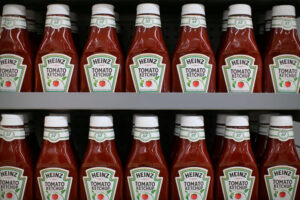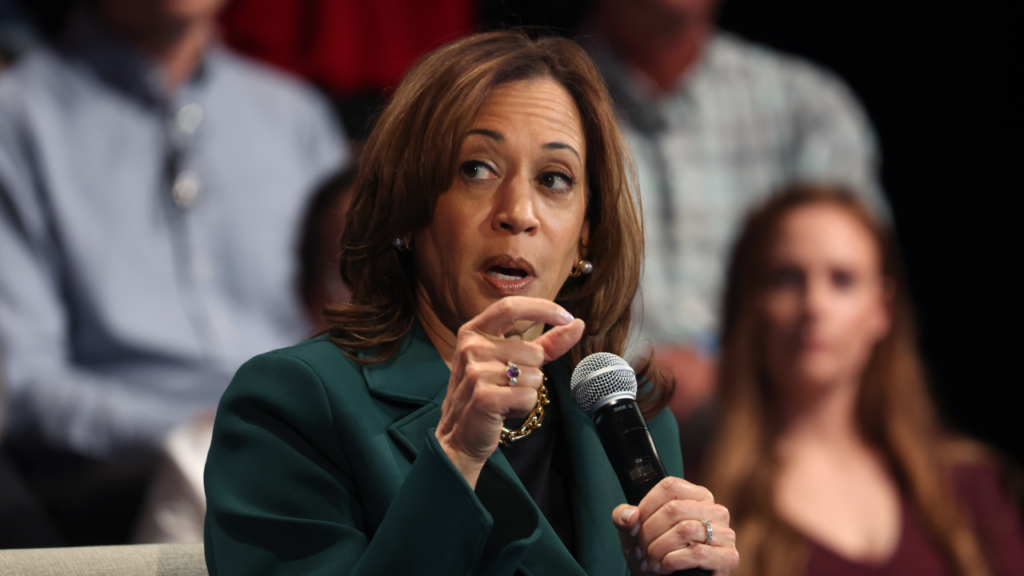Scott Olson / Staff/ Getty Images
With inflation being a primary concern for both consumers and businesses, presidential candidate and current vice president Kamala Harris has promised to tackle high prices by banning price gouging by grocery and food companies. Here’s how it can impact small businesses.
What Harris is promising
Harris’ campaign is promising to tackle inflation and lower prices by federally banning price gouging by grocery stores and food suppliers, as well as cracking down on “anti-competitive practices” between large corporations.
Price gouging happens when businesses take advantage of a crisis or sudden increase in demand to unfairly raise prices. While businesses are generally allowed to raise prices in relation to supply and demand, sudden price increases on essentials such as fuel, food and medicine is considered price gouging. Price gouging is typically defines on a case-by-case basis.
37 states currently have laws on price gouging, typically in relation to costs on essentials during disaster scenarios such as a hurricane or a pandemic. Harris’ proposal would be on a federal level, applying to prices and products in the entire United States.
How exactly the Harris administration will enact and define price gouging for businesses and suppliers has not yes been outlined in detail.
How stopping price gouging will impact small businesses
While Harris’ policy seems to be aimed at larger corporations, price gouging rules can have a trickle-down effect on small businesses.
Laws targeting consolidation in the grocery and food industry may offer more opportunity for small businesses to offer competitive pricing and gain market share in an area otherwise dominated by large franchises.
While lowering inflation overall can give consumers more money in their pockets to spend, some economists warn that top-down government price caps may not be the way to do it. Some unwanted potential side effects of price caps include increases in non-interest fees and commissions, lower credit supply available to individuals and businesses and lower profits for banks.
While bans on price gouging can help in limited scenarios such as in disaster zones, larger mandates can also lead to a restriction in supply, as the costs of energy, manufacturing, packaging, labor and transport tend to be fixed.
This can result in businesses with smaller margins having a tougher time making a profit, while larger corporations with the ability to take area and product-specific losses can continue to operate and profit on other sales.
Additionally, economists warn that price laws do not address the root causes of inflation, which include factors such as energy costs, labor shortages and supply chain issues.
Bankrate’s expert take on banning price gouging
“Price gouging is something that has been typically associated with extreme weather events, or is very sector specific and is targeted by state laws,” says Mark Hamrick, senior economic analyst for Bankrate. “Small businesses would not generally have the leverage in the marketplace to try to push unwarranted price increases in the first place. Operators of smaller enterprises have other things to worry about and to attend to.”
Harris’ inflation promise: The pros
- Prices for groceries and essentials will be lower for consumers, giving them more overall spending power.
- There will be more policies that target anti-competitive practices, giving small businesses a boost when competing against larger corporations.
- Lower supply costs can trickle down to small businesses.
Harris’ inflation promise: The cons
- Price caps can lead to supply issues across the grocery and food industry.
- Stores with lower profit margins may be edged out by large corporations with more capital.
- Price gouging laws don’t address the issue of higher costs for labor, energy, transportation and other factors.
The bottom line
Should she win the election, Harris has promised to make tackling elimination a top priority. However, it remains to be seen exactly what that plan is and how effective it will be. Additionally, the debate over whether a top-down approach to price gouging and inflation is the right way to tackle the problem.
Read the full article here
















